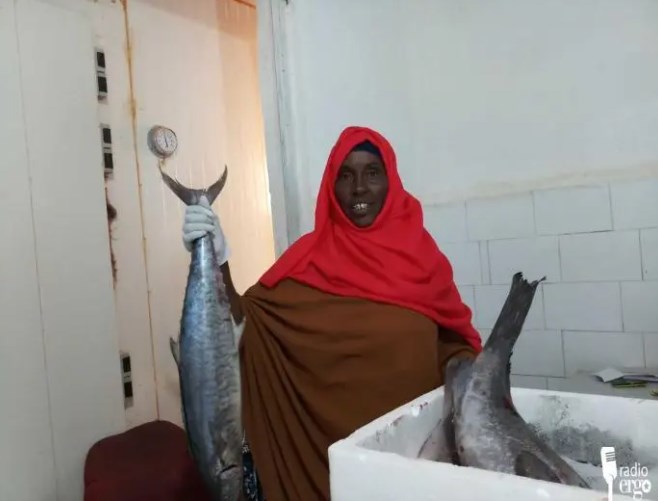
Thursday May 9, 2024

Sweat and sacrifice propel Somali women in Puntland into male-dominated fishing business
Training and investment to start her own small business has enabled Hakimo Farah Abdullahi, her husband and her nine children to move out of the displacement camp where they faced years of hardship into a rental house in Hobyo town.
The stall selling cooked fish she opened in January is bringing in $10-15 profit per day, which has lifted them from poverty.
“Previously we would only sometimes get enough food and often we would sleep hungry, but we are now doing so much better. This business has helped us and I have worked hard,” Hakimo said.
She was among 30 poor women who received training and equipment to start up in business under a local government project in Hobyo, Mudug.
Hakimo was given two fridges and cooking equipment, and she borrowed an additional $500 from her relative to buy more items to advance her business.
She and her family had moved to Hobyo in 2017 after severe drought killed their entire herd of 150 goats in Ba’ad-ade village in the rural areas. They left behind their three-room house in the village and walked toa displacement camp in Hobyo with the children as they could not afford fare for transport.
“We depended on our livestock for a living but since the livestock perished and there was no fodder or water due to severe drought in our home, we will not be going back. I am the breadwinner now for my family,” she said.
Her husband goes out to sea fishing while two of her children help her at the stall. She said they have already built up a good customer base and she plans to expand to sell other items including clothes and food.
She has enrolled five of her children in a local school, paying $25 for their education.
Hakimo was trained for two months on how to manage her business and finances and is saving part of her income while also paying for her family’s immediate needs.
Maryan Muhidin Yalahow also received equipment and training and has been selling cooked fish for the past two months, making about $10 a day from her small restaurant. Her income provides a stable income for her nine children. Every morning, she gets fish from the shore to cook and sell.
“I go to the sea to buy fish in kilos from the fishermen who have brought in their catches. I store the fish in the fridge and later fry them and sell them. We make our living including the children’s education fees, electricity and even water bills,” she said.
She had been begging in the streets and was lucky to get one meal but is now a successful business woman. Maryan also takes care of her elderly husband who cannot work.
Maryan and her family were displaced from the rural areas of Hobyo in 2021, after her 100 goats died in drought. She said she is now enjoying the best time she can remember and has enrolled three of her children in school.
She is saving up to build her own house so they can move out of the small iron-sheet house they have been living in that belongs to their relatives.
The deputy commissioner of Hobyo, Muqtar Abdullahi, told Radio Ergo that the women who had been supported were among the most vulnerable displaced families. The project, funded by the Galmudug Ministry of Ports and Fisheries, aimed to reduce poverty in the IDP camps.
He said fishing was a viable business for residents in the coastal town and that the authority had set up a training centre where women can receive advice on their businesses.
“The women have set up an association and it’s always important to give training to these women so that they can run successful businesses,” he said